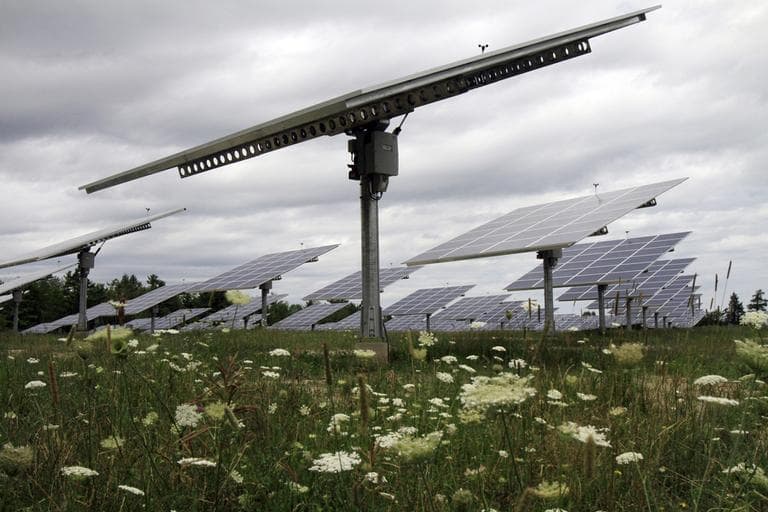Advertisement
The Renewable Energy Arms Race
ResumeWe’re talking about China’s big move on the world’s green future. Investing big and playing hardball as the U.S. struggles to compete.

American politics are roiled right now over U.S. loans to the failed U.S. solar energy company Solyndra. But across the Pacific in China, the Chinese government is underwriting renewable energy work on a scale that dwarfs American efforts.
China is the world’s biggest polluter. But it is also moving at high speed to become the world’s green energy powerhouse. Wind and solar and much more. It’s investing big. It’s playing hardball –- some say unfairly. And it’s making a big claim on the future –- and future jobs.
This hour On Point: China’s big move on the world’s green energy future.
-Tom Ashbrook
Guests
Steve Hargreaves, senior writer for CNNMoney.com where he covers energy industry
Keith Bradsher, Hong Kong Bureau Chief for the New York Times, where he covers Asian business, economic, political and science news
Josh Freed, Vice President of the Clean Energy Program at Third Way
Highlights
Three years ago, the U.S. was the world’s leader in renewable energy, but China has invested heavily and taken the lead. It has meant that the cost of making renewable energy technology, wind turbines and solar panels, for instance, has fallen dramatically.
“China has gone from being almost a non-player in renewable energy to being the world’s dominant player in renewable energy,” Keith Bradsher, Hong Kong Bureau Chief for the New York Times told On Point. He said the Chinese government is motivated by nervousness about its own energy security, having moved from a net energy exporter to an energy importer.
The crash program in renewables is made possible by major government investment, which heavily subsidies the renewables program. Making solar panels isn’t all that expensive, Bradsher said, the key is getting enough money to keep businesses afloat while the initial investment is recouped.
That investment has reduced the cost of power from renewable power sources, wind power, for instance, is now only about 50 percent more than coal, according to Bradsher.
Steve Hargreaves, senior writer for CNNMoney.com, said that the impact of the Chinese renewables push has been very difficult for U.S. companies. The plummeting cost of solar panels --their cost has fallen 40 percent this year alone-- has pushed many U.S. companies into bankruptcy. Hargreaves said that U.S. companies are also struggling against a patchwork of regulations that vary widely between the states.
“I don’t know if we’re ever going to compete with China in terms of the manufacturing process,” Hargreaves said. He said that the U.S. may end up working hard to find out how to pay for Chinese renewable products.
“It is understandable that there is real concern and frustration here,” said Josh Freed, Vice President of the Clean Energy Program at Third Way. The Chinese are stealing intellectual property and violating trade rules, but they are also putting in place smart policies that are helping them dominate the renewables market. “It means that jobs that could have been made here are going to China,” he said.
From Tom's Reading List
CNN Money: Matthew Kahn, an economics professor at UCLA, speaking Wednesday at Fortune's Brainstorm Green conference said "This is not a zero sum game. This makes the United States better off." The United States wins because Chinese investment provides a market for U.S. companies in the alternative energy space. Plus, Chinese investment helps advance clean energy, bringing it closer to cost competitiveness with fossil fuels.
New York Times: "These efforts to dominate renewable energy technologies raise the prospect that the West may someday trade its dependence on oil from the Mideast for a reliance on solar panels, wind turbines and other gear manufactured in China."
Salon.com: "The broader context around the Solyndra decision is that the nation was on the brink of a depression and the Obama administration was attempting to move as quickly as possible to pump money into the economy that would not only stimulate economic growth, but also serve the larger agendas of creating green jobs and combat the challenge of climate change. [...] But there's an even larger context. China will shortly roll out its 12th five-year-plan for renewable energy deployment. The details of China's plan, [..] are nothing short of staggering."
This program aired on September 26, 2011.
